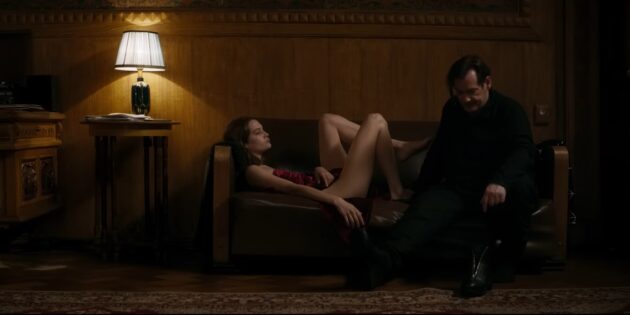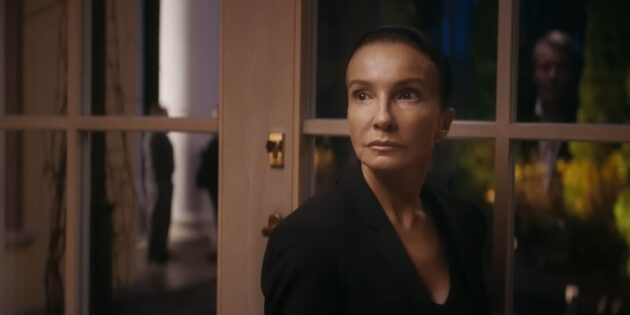On May 18, the premiere of the first episode of the series "Ballet" took place. Despite not the most successful start, it remains interesting.
Directed by Evgeny Sangadzhiev ("Happy End"). Alexey Kiselyov and Anastasia Koretskaya ("Happy End"), Lev Murzenko ("Trigger"), Serafim Orekhanov ("Headshot"), Vladislav Kaptur ("Happy End" editor) worked on the script. A large team of co—authors can be explained by a long period of production - "Ballet" was prepared for three years, during which time the performer of the main role even changed.
Instead of Ingeborga Dapkunaite, Alla Sigalova, the head of the Department of "Modern Choreography and Stage Dance" at GITIS, who has not played in films since 2012, was filmed. Secondary characters were played by Marusya Fomina ("Container"), Igor Gordin ("Challenge"), Fyodor Bondarchuk and others.
Ruta Myers is one of the most famous choreographers in the world. As a young Soviet dancer, she stayed in the USA during the tour, after which she built a successful career in America. After 40 years, she is invited to the main ballet theater of Russia to put on a performance. Believing that her creative path has reached a dead end, Ruta Myers accepts the invitation. She has to fight not only with the bureaucracy that hinders creativity, but also with former friends and acquaintances who have become big people.
After the premiere of the first episode, it seems that the trailer was more interesting. Considering that the series will be released once a week, the prospects for the series are vague. The slow pace of the narrative, as well as a huge number of minor characters, slow down the development of the plot. If you've watched the trailer or read the description, you know everything about the first episode.
It's not entirely clear what Ruta Myers is. What she wants, what she will do, how she feels about her return — the first episode ignores these questions. It turns out an empty, albeit spectacular character.

The first episode reveals the minor characters very poorly. What they are doing, what they want is not at all clear. There is a rather strange hero (the husband of Ruta's assistant) who constantly goes to auditions, but they don't take him anywhere. A nasty careerist, while without talent — in general, this is a negative character. In the first series, he has absolutely no influence on what is happening, but he is shown very often — it's even strange that so much time is given to him.
"Ballet" begs for comparison with the TV series "Actresses", released in April. Both projects show what is happening behind the scenes of the theater. However, the "Actresses" reeked from the very first episode. A huge number of characters did not turn into a problem because of the excellent script and lively dialogues. The first series of "Ballet" is spent on a very sluggish swing. It's not a fact that the viewer who spent an hour on the pilot will remember the release of the second episode in a week.
There are many elements in "Ballet" that need to be taken on faith, without asking unnecessary questions. For example, it is not explained why Ruta Myers is so good. She is a great modern choreographer, but what is special about her? Why is she appreciated, how does she differ from other masters? Throughout the first series, it seems that her main achievement is the very fact of working in New York.
It is completely unclear on what terms Myers agrees to work in Moscow. Only a dialogue is shown in which she is offered a position, but negotiations and discussion of her subsequent activities remain behind the scenes. If you consider that she is so famous and respected, then it is unlikely that she agrees to everything. Therefore, she had to make demands. But further events show that no one is waiting for her and does not want to listen.
For example, when Ruta Myers asks to show her all the dancers of the theater, the workers begin to resist — they say, no, see only the best. It would seem that a superstar has come to you, do not interfere with her work. Besides, she has a pretty clear requirement — she wants to know who is at her disposal. As a result, Rue is forced to break through this wall, which arises for some reason.

The theater itself, in turn, is profit-oriented. And the arrival of Ruta Myers worries many because she does not fit into the repertoire - she puts on a modern ballet, not a classical one, and this seems to be a problem. However, through the word it is mentioned that she is a superstar. What's the problem then? Will she not gather an audience? Will collect. Doesn't fit into the repertoire? But the theater is already staging a modern ballet (this is mentioned in the dialogues).
The problems that Myers faces look far-fetched and artificial. Moreover, they are solved not by intelligence, but by repeating words. When Ruth Myers is refused, she simply says: "Show the whole troupe," but this time successfully. Such is the overcoming. It's as if Rambo would say, "Stop hunting me," and they would stop being hunted.
The series very gently (almost lovingly) talks about soft censorship, that is, topics that are better not to touch in the repertoire. It is mentioned several times that high-ranking officials and intelligence officers go to the performances, and therefore you need to be more careful. At first it seems that the series ridicules the prohibitions in the Russian theater. However, all this is unimportant and almost irrelevant — the characters talk about it as if they are discussing technical problems like the need to replace a light bulb. The screenwriters seem to want to speak out about censorship, but they cut themselves off in mid-sentence. It looks strange — it's better not to start such a conversation at all.

At the same time, the series hits the USSR much harder. The KGB pursues dancers during international tours, and they are being monitored inside the Soviet Union. There is no question of freedom (as such or creative), which is why Ruta Myers becomes a non-returnee. Here the screenwriters show that they are ready to talk about serious topics without hints, and it turns out great.
Sometimes the objects of satire look quite strange. In the very first episode, the scriptwriters are ironic about the family ties of theater workers — here one father attached his son, here another father attached his daughter. Everything would be fine, but only Lisa Yankovskaya and Fyodor Bondarchuk (and his son is one of the producers) played the first roles.
All the questions and complaints that can be addressed to Ballet are somehow related to the script. Everything else is on top. This is another Russian project with an excellent visual range. Large rooms are filmed using panoramas, a static camera is almost not used, so each scene turns out to be interesting and independent. Considering that the series is doing great with the costumes, it turns out a very nice picture. Ballet (or dance) fans will also enjoy the choreography — there is a lot of it in the series.
Alla Sigalova in the main role is also curious. It hardly matters her real experience as a choreographer, rather it helps her that she is a really good actress. Of course, she was unlucky that the film "Tar" was released not so long ago, so I involuntarily want to compare her with Cate Blanchett (it is clear in whose favor), but Sigalova adds status to the series. She looks and behaves like a superstar.

Before the release of the first series, "Ballet" looked like one of the most interesting novelties of spring. The premiere lowered expectations and raised many questions. The project still deserves attention, but there is a risk that the scenario problems that appeared in the first episode are characteristic of the entire series. In this case, Anna Sigalova, excellent camerawork and beautiful dancing will not save him.